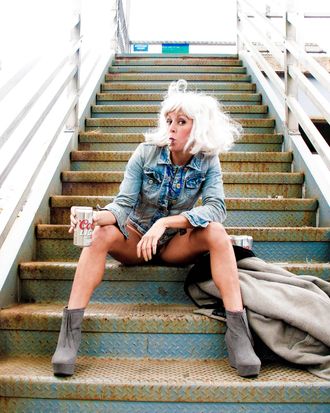
When you’re a woman performing a show about rape jokes, the question almost always comes up: So, like, have you ever been, ya know … ?
The performance artist Adrienne Truscott won’t answer either way, because, she says, it has no bearing on whether or not she’s “allowed” to perform her one-woman show, Asking for It: A One-Lady Rape About Comedy Starring Her Pussy and Little Else!, playing at Joe’s Pub on May 30. “Nobody ever says to a male comedian, ‘That joke about rape is really funny. What’s it like being a rapist?’” Truscott told the Cut, laughing.
Truscott’s show is not for the controversy-averse or anyone particularly uncomfortable with nudity: It opens with George Carlin’s “Rape is funny” monologue projected onto her naked vagina. But it’s also not for the (mostly straight, almost entirely white) male comedians and politicians whom Truscott satirizes in her hour-long performance. Asking for It is a show about rape, and there are rape jokes, but it’s presented with a very specific purpose: The performance allows Truscott to re-appropriate rape jokes as a way to skewer the pervasive culture that allowed comedians like Daniel Tosh to feel comfortable telling them in the first place.
“I wanted to make fun of how fucking stupid a lot of the ways we talk about rape and legislate it are,” Truscott told me over coffees in a Brooklyn café. “If you grow up in this world as a woman, there’s a whole bunch of stuff you see and understand that not all guys see or understand or even believe happens, even when you say, ‘No, dude, I’m telling you, every fucking day.’ That was part of why I was like, ‘I’ve got to say it.’”
To Truscott, a choreographer and circus performer who’s also one half of the “neo-vaudevillian” burlesque duo the Wau Wau sisters, telling a funny rape joke is as much about the content of the joke as it is about the joke-teller itself: She believes men can tell a clever rape joke, for example, but their intentions and comedic history affect how it’s perceived. You can bring up controversial topics like suicide or rape to emphasize how horrible they are or even to make people laugh at their own “lazy complicity,” but that dark material, says Truscott, “is not just there to be like, ‘Can you believe I said that? I’m a baller because I just walked out and said it and I didn’t care who heard it.’ That doesn’t make you the baller you think you are.”
Plus, she notes, comedy is about punching up — if you’re a white male comic telling material that clumsily glorifies violence against women, you’re not being edgy, you’re just being an asshole. She cites Tosh’s infamous “Wouldn’t it be funny if that girl got raped by, like, five guys right now?” joke as an example of this. Alternatively, Louis C.K.’s “You should never rape anyone. Unless you have a reason, like if you want to fuck somebody and they won’t let you” works, partly because the absurdity makes the rapist so clearly the punch line, and partly because, as Jezebel put it in 2012, “Louis CK has spent 20 years making it very publicly clear that he is on the side of making things better.”
A lot of Asking for It hinges on the “Can you believe someone actually said this?” joke construction, a format honed by many late-night-show hosts that skewers the “she was asking for it” types. Through Truscott’s wise choice of targets, the show emphasizes that no, of course the act of rape isn’t funny, but sometimes the way we treat the topic is. Plus, she knows the topic is controversial — but that’s kind of the point.
“I totally get when people are like, ‘A comedy about rape? What? That’s terrible,’” Truscott said. “But it’s funny to me that, like, in some ways, that’s indicative of how much the conversation is still not in our hands.”




